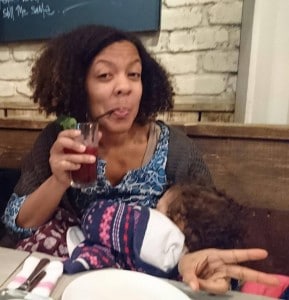
What does the law say?
- It is entirely legal to breastfeed in public places anywhere in the UK.
- According to the Equality Act of 2010, treating a woman unfavourably because she is breastfeeding a child of any age is considered sex discrimination. This applies to any business or premise providing services to the public, including public institutions, associations and higher education bodies.
- Service providers dealing directly with the public must not discriminate, harass or victimise a woman because she is breastfeeding. Discrimination includes refusing to provide a service, providing a lower standard of service or providing a service on different terms.
Can cafes, restaurants and shops ask a breastfeeding woman to leave?
-
- Businesses, such as a cafes, restaurants and shops, are not allowed to ask a woman to stop breastfeeding her child or refuse to serve her. This is applicable to mothers breastfeeding children of any age, as the law protects them for as long as they wish to breastfeed their babies.
- If anyone being served in a cafe takes offence at a breastfeeding mother, the business owner could offer to move them to a different table, but it is against the law to ask the mother in question to leave because she’s breastfeeding.
- A guide produced by the Government Equalities Office to explain the 2010 Equality Act to businesses selling goods and services states: “A business may ask a breastfeeding woman to leave their premises if the reason for this request is not due to her breastfeeding. However, if the woman later claims that discrimination occurred because she was breastfeeding, the business will have to prove that there was in fact no discrimination.”
- It is possible that individual business employees, owners or managers may not be aware of these regulations and may tell a woman that she cannot breastfeed on the business premises. If this happens, the mother can challenge their request.
- If still asked to stop breastfeeding or leave the premises, a woman can contact the Government Equalities Office. A solicitor can advise on whether a claim can be brought for discrimination under the 2010 Equality Act.
What about communal public spaces?

If a mother is out with her baby she may need to stop and breastfeed. She is not required to cover herself or go to a specific feeding room, but people may occasionally object.
In England and Wales
A woman cannot be prosecuted for breastfeeding under public decency laws. A mother can ignore people who ask her to stop feeding and she can just carry on. Unfortunately though, she has no specific legal protection against their actual comments objecting to breastfeeding. If, however, the remarks become aggressive or abusive then women have a right to report this as with any other form of abuse.
In Scotland
Under Scottish legislation, it is an offence to deliberately prevent or stop a woman from breastfeeding in a public place. If a mother is approached by anyone, anywhere, and asked to stop breastfeeding, she has the right to phone the police who will attend, discuss with the person involved, and warn them that they are committing an offence liable to a fine of up to £2,500.
In Northern Ireland
Breastfeeding mothers are protected by sex discrimination laws that prohibit anyone from treating a woman unfavourably because she is breastfeeding and the Government intends to introduce specific legislation to support and protect breastfeeding infants and their mothers in public places.
Breastfeeding is normal
Although in recent years breastfeeding may have been considered something which should not be done in public, limiting nursing when out and about can restrict your baby’s food intake. Breastfeeding is the most natural way of understanding and satisfying your baby’s needs and its importance in terms of promoting healthy development for both baby and mother is officially recognised by healthcare organisations all over the world. The more often breastfeeding is noticed, the more easily it will be accepted by the public, leading to a change in people’s attitudes and a reduction in any criticism.
Written by Anna Burbidge and Eva Williams
Copyright LLLGB 2016
Further reading
Out & about with your breastfed baby
Supporting women’s right to breastfeed
2010 Equality Act
Information for New Mothers, Pregnant Women and Families – Information about Feeding a Child in Public and Private Spaces: The Breastfeeding etc. (Scotland) Act 2005


